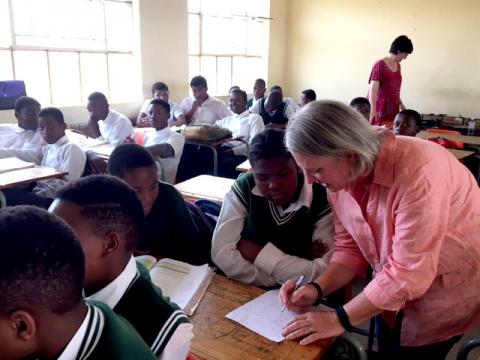
After seeing success in K-12 classrooms in the United States, Quality Talk, an empirically supported instructional approach, now will help students in international classrooms achieve academic success.
Developed in 2002 by P. Karen Murphy, distinguished professor of education (educational psychology), Quality Talk is designed to promote high-level comprehension and teaches students to generate oral arguments via small-group discussions. The approach primarily has been used in language arts and science classrooms but can be adapted to multiple content areas across all grade levels. It consists of four major components: instructional frame, discourse elements, teacher modeling and scaffolding, and pedagogical principles.
"In 2015, my research team was awarded a small research grant from National Taiwan Normal University's (NTNU) Learning Sciences Consortium to translate some of our Quality Talk materials into Mandarin to increase accessibility for various faculty at NTNU," Murphy said. She noted that the grant was awarded after she presented the Quality Talk model at a conference held in Taipei, Taiwan.
After the material was translated, NTNU faculty became more interested in the approach and in early 2016, Murphy, along with College of Education Dean David H. Monk, was invited by NTNU Executive Vice President Yao-Ting Sung to visit the university. The invitation came on the heels of a long-established relationship between the College of Education and NTNU.
"I gave a workshop to NTNU faculty and graduate students on Quality Talk with specific attention to the implementation of the approach and how it might be executed at the university-level in college classrooms," she said. "We were overjoyed to learn that several faculty had already begun small pilot projects using Quality Talk in their English-language courses."
Many of the educators who piloted the approach later presented their results at the 4th annual International Workshop on Advanced Learning Sciences (IWALS), where Murphy and Monk served as keynote speakers in the summer of 2016. Since then, Murphy and her team of researchers, which includes Carla M. Firetto, Ana M. Bulter, Liwei Wei and Mengyi Li, have worked closely with Joyce Chao-chen Chen, vice president for academic affairs and professor of the Graduate Institute of Library and Information Studies at NTNU, to continue translating Quality Talk into a more culturally meaningful intervention that includes eloquent examples and guides for both educators and students.
"The goal is to use Quality Talk as a pedagogical tool in all English and ancient Chinese courses for undergraduate students at NTNU," Murphy said. "The amazing faculty at NTNU are not just implementing Quality Talk, they are studying its impact and refining the approach to maximize its usefulness."
The results of those initial studies will be published in two upcoming books — one which will focus on the implementation of Quality Talk in English language courses, and the other, which will be written in Mandarin, will focus on the use of the approach in NTNU's ancient Chinese courses.
In addition to working with faculty and students at NTNU, Murphy also has provided professional development workshops to nearly 100 teachers from local schools in Taipei. This has led NTNU feeder schools to express interest in and a desire to learn more about how Quality Talk can be used to help improve the reading comprehension of high school and elementary-age students. It is the goal of Vice President Chen to encourage the local feeder schools in Taipei to implement Quality Talk, Murphy said.
But Murphy and the Quality Talk team haven't stopped there. In addition to promoting Quality Talk in the United States and Taiwan, the researchers also are collaborating with faculty and students at the University of Pretoria in South Africa.
"In South Africa, we have attempted to build upon Professor Liesel Ebersöhn’s Flourishing Learning Youth (FLY) project, a decade-long project where resilience is studied in remote, rural settings from an educational psychology perspective," Murphy said. "Our focus has been to partner with her, Dr. Funke Omidire, an enthusiastic team of doctoral and master’s students and two gracious, amazing teachers to adapt Quality Talk for a context that is very different than most American schools."
South Africa has 11 recognized national languages, Murphy said, although English is used as the primary language for instruction in schools.
"Like our NTNU partnership, language is a key focus and Quality Talk is being used as a mechanism to promote oral fluency as well as verbal and written thinking and reasoning through discourse," she said. "In the end, the ultimate goal is to enrich these teachers’ and students’ pathways to resilience through enhanced teaching and learning."
In the 16 years Murphy has been continually developing and refining Quality Talk, she never imagined the global impact it could have. And she said she is grateful for the many opportunities the College of Education has afforded her and her team to expand the model on an international level.
"For our team, collaborating with faculty and students at NTNU and the University of Pretoria has opened a whole new world of possibilities for Quality Talk. We never dreamed that such collaborative partnerships would even be a possibility," she said.
Murphy says it is because of the generous support of Monk and Greg Kelly, senior associate dean for Research, Outreach and Technology, that these partnerships are possible. She also credits the Harry and Marion Royer Eberly Faculty Fellowship, an endowed faculty fellowship she held until June 2017 that provides funds for research expenses and faculty release time to develop programs. It also funds graduate assistant salaries and other support services for faculty research. It is her hope, she says, to continue to expand Quality Talk to help students across the globe.
"I'm hopeful and optimistic that participation in Quality Talk discussions will enrich students' reasoning, enhance their comprehension and fluency, and promote critical-analytical thinking about, around and with text and content."